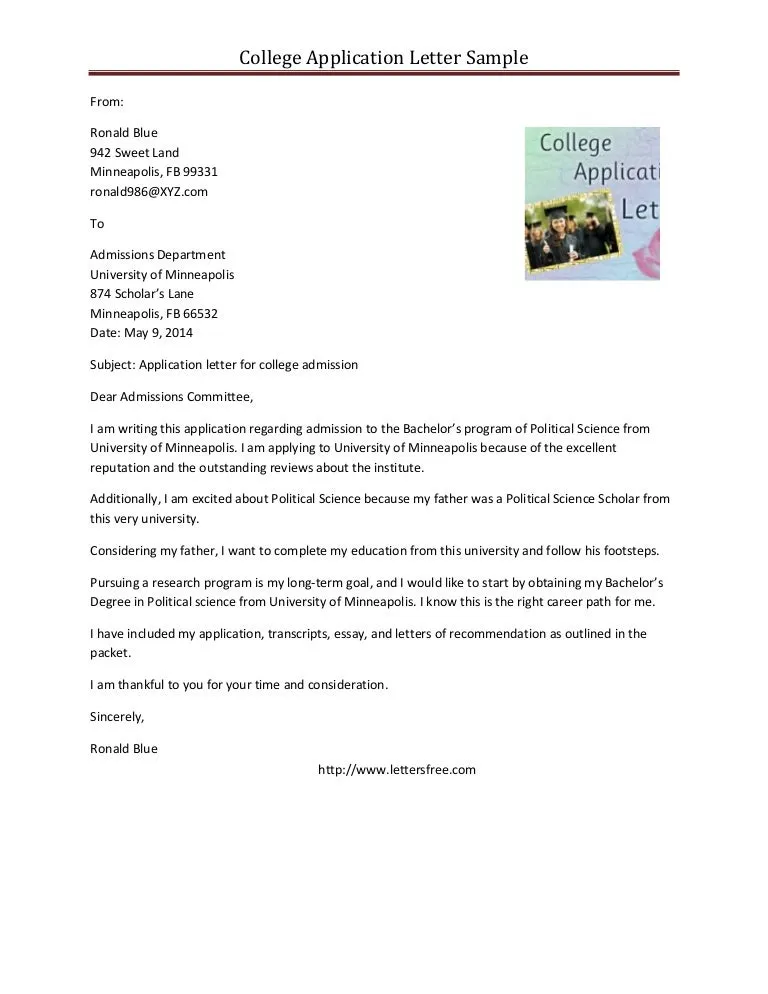What is a College Application Cover Letter
A college application cover letter is more than just a formality; it’s your personal introduction to the admissions committee, offering a glimpse into your personality, experiences, and ambitions beyond the confines of your academic record and standardized test scores. This letter serves as a crucial element in your application package, allowing you to present a compelling narrative and underscore your unique qualities. The primary goal of a well-crafted cover letter is to make a memorable first impression and effectively communicate why you are a suitable fit for the college. It’s an opportunity to share your passions and aspirations, giving the admissions committee insights into your motivations and future goals.
Why Write a Cover Letter
While a cover letter might not be a mandatory component for all college applications, it presents a strategic advantage that should not be overlooked. It offers you the chance to provide context to your application, explain any circumstances that may require further explanation, and express your genuine interest in attending the institution. This personalized touch allows you to connect your experiences, skills, and aspirations with the values and offerings of the college. Especially if your academic transcript doesn’t completely reflect your potential or if you have a unique background, the cover letter becomes your platform to create a cohesive and compelling narrative, highlighting the value you would bring to the college community. By including a cover letter, you demonstrate initiative, showing your enthusiasm and eagerness to attend the college.
Highlighting Your Achievements
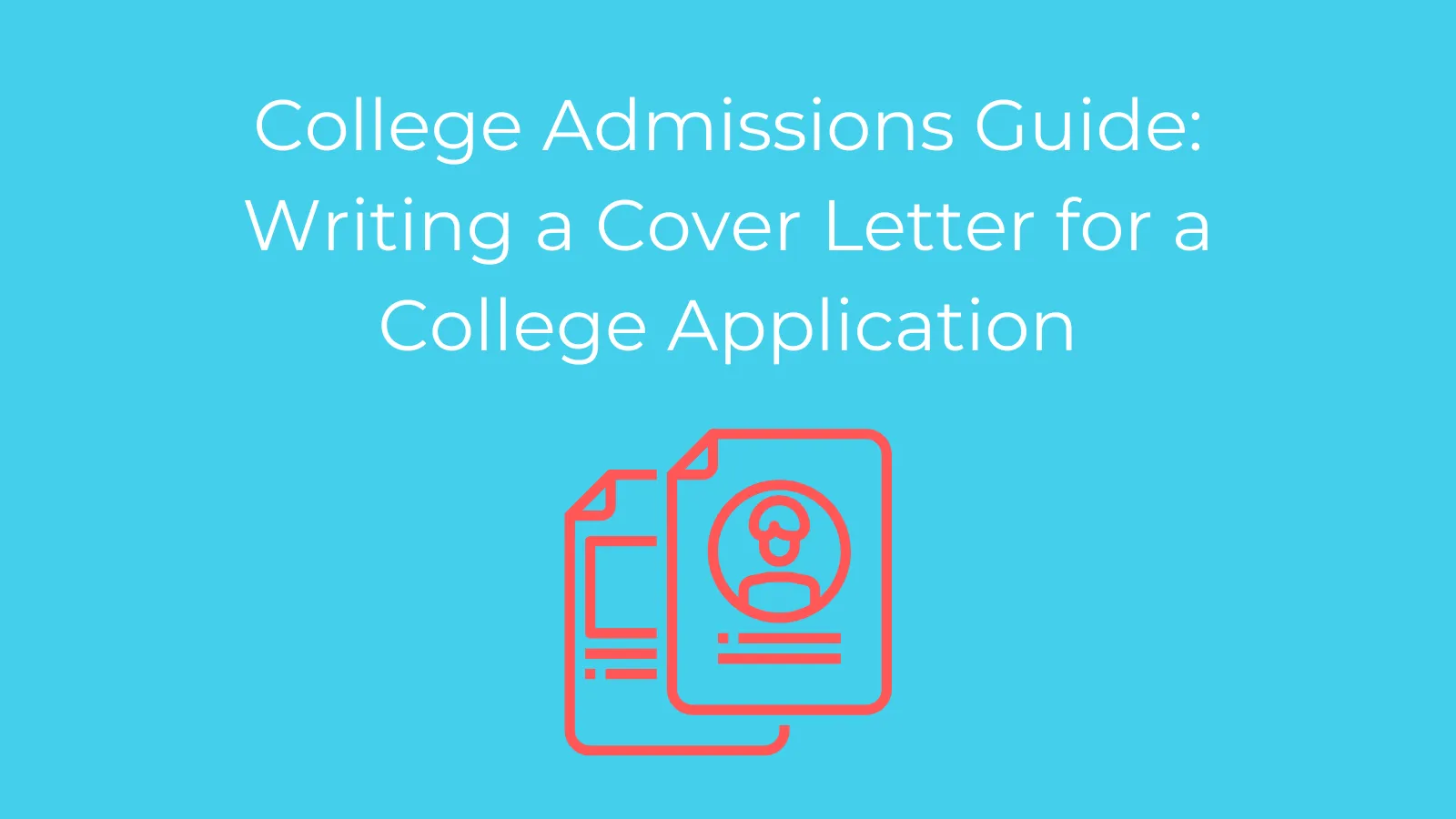
Your cover letter is the perfect place to spotlight your key achievements and articulate your unique value proposition. Instead of merely listing accomplishments, it’s essential to weave a narrative that illustrates your skills, experiences, and how they align with the college’s mission and values. It is necessary to provide concrete examples of your impact in extracurricular activities, projects you’ve spearheaded, and any awards or recognition you’ve received. Quantifying your achievements and providing specific, measurable results makes your accomplishments more impactful and memorable. Instead of vaguely stating you were a ‘good leader,’ describe a specific instance where you took initiative on a project and the positive outcomes. Always connect your achievements to what you want to study and your future aspirations. Doing so showcases your purposefulness and drives to the admissions committee.
Think about a specific challenge you overcame or a goal you achieved. Then, explain the skills and qualities you developed in pursuit of that goal. The core objective is to show, not just tell, using specific examples to prove how you have leveraged those skills and to demonstrate to the admissions committee the kind of student you will be at their college. The best cover letters bring your personality and experiences to the forefront, differentiating you from other applicants.
How to Structure Your Cover Letter
A well-structured cover letter will ensure your message is clear, concise, and engaging for the reader. The structure of the letter will guide the reader through your key points, helping them quickly understand your value. A great cover letter must include a clear header, a compelling introduction, several body paragraphs that highlight your achievements and experiences, and a strong closing with a call to action. Each section has a specific purpose, working together to provide a well-rounded view of your candidacy. The format must have a logical flow. The presentation of your cover letter is crucial in making a lasting impression.
Header and Introduction
Begin your cover letter with a header that includes your contact information, such as your name, address, phone number, and email address. The introduction should immediately grab the reader’s attention, making it clear why you are writing and what your main goal is. Open with a concise statement that conveys your purpose for writing. Highlight a key skill or achievement that you will expand on later. This section sets the tone for the rest of the letter, which will make the admissions committee want to know more about you. Aim for an introduction that is engaging, personal, and sets the tone for the rest of the letter. This is where you provide a glimpse of your personality and what sets you apart from other applicants.
Body Paragraphs
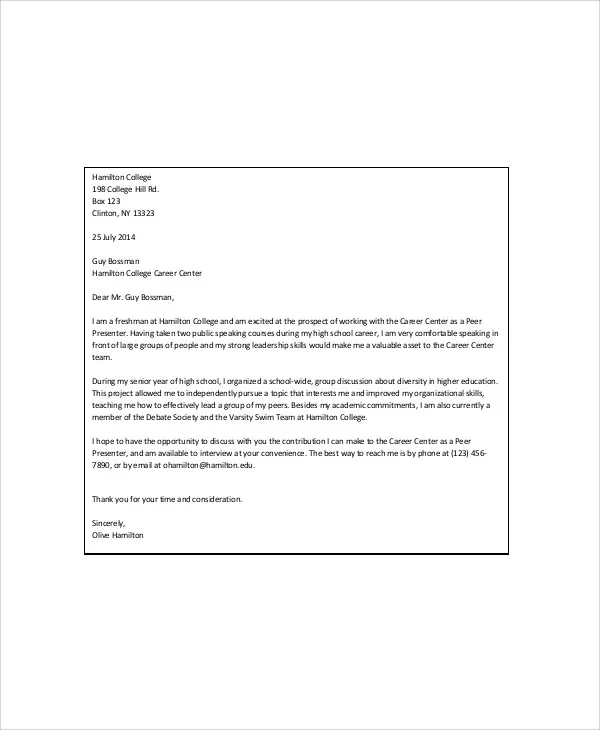
The body paragraphs are where you delve deeper into your experiences, skills, and achievements. Structure each paragraph around a central theme or point, supported by specific examples and evidence. You could dedicate one paragraph to discussing your leadership skills. Another might highlight your teamwork abilities. Focus on the skills and qualities that align with the college’s values and your intended major. These paragraphs should expand on the points you introduce in the introduction, providing specific examples that demonstrate your qualities and accomplishments. Connect each paragraph to the college’s goals and values.
Closing and Call to Action
Your closing paragraph should succinctly summarize your qualifications and reiterate your interest in the college. Thank the admissions committee for their time and consideration. Include a call to action by expressing your enthusiasm for the opportunity to attend the college. Also, you can state your eagerness to discuss your application further or answer any questions they might have. This final section should leave a lasting, positive impression, emphasizing your suitability for the college and your genuine excitement to attend.
Key Elements to Include
A successful college application cover letter needs to include key information about you. Tailor your letter to the specific college, demonstrating that you understand and align with their values. You want to highlight your unique qualifications and the skills you will bring to the college. Showing that you’ve thoroughly researched the college and showing your genuine interest is very important. A strong cover letter is about connecting your experiences to the college’s values. It will make a stronger impact when the admissions committee sees that you know what the college is all about, beyond just academic credentials.
Academic Achievements

Showcase your academic excellence by highlighting any awards, recognition, or notable projects. Mention the specific courses or areas of study that you find interesting, and discuss why. Mention your GPA and test scores, if they are competitive, and highlight those. Explain any academic challenges you’ve faced and how you overcame them, demonstrating your resilience and ability to learn. Provide clear evidence of your hard work and dedication. Also, be sure to connect your academic interests to the college’s programs or professors, which further shows you did research on the college.
Extracurricular Activities
Provide details about the extracurricular activities you’ve participated in. Include the roles you held, your responsibilities, and the skills you developed. Highlight your contributions and the impact you made on each activity. If applicable, discuss any leadership positions you held, the challenges you faced, and how you overcame them. Also, explain how these activities have shaped you as a person. Be sure to show how your extracurriculars relate to your interests and future goals, demonstrating your passion and commitment to your activities.
Skills and Qualities
Demonstrate the skills and qualities that make you a strong candidate for the college. The essential qualities that you can highlight are communication, teamwork, problem-solving, and leadership. Give specific examples to back up these skills. For instance, you could describe a situation where you effectively resolved a conflict or led a project to a successful completion. Reflect on your personal qualities, such as perseverance, creativity, and integrity. Showcase these qualities through relevant experiences. When demonstrating the quality of integrity, for example, you could explain a time where you had to overcome a challenge.
Common Mistakes to Avoid
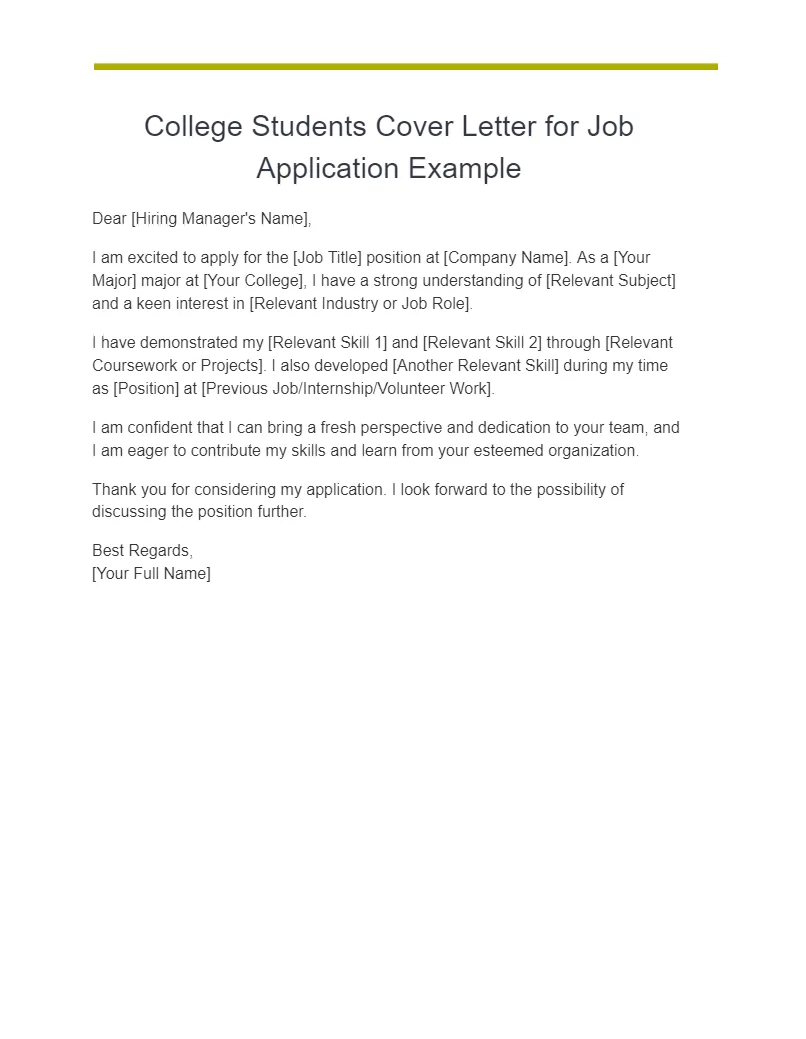
Avoiding common mistakes is essential for a successful cover letter. Here are the key pitfalls to sidestep to ensure your application stands out for the right reasons.
Generic Statements
Avoid using generic statements or clichés that could apply to any applicant. Use specific details and try to be unique in your writing. Avoid vague phrases that won’t make you stand out. Instead of saying you are a ‘hard worker’, tell them about a time you worked diligently to achieve a goal. Always include information that is unique to you and what you can bring to the college. Be sure your writing is personalized and stands out from the crowd.
Typos and Grammatical Errors
Proofreading your cover letter for typos and grammatical errors is extremely important. These errors can create a negative impression of your attention to detail and professionalism. Carefully proofread the letter, and ask a friend, teacher, or counselor to review the letter for you. Ensure the grammar, spelling, and punctuation are correct throughout the entire letter. A polished, error-free cover letter will showcase that you are committed to excellence, which will make a strong impression on the admissions committee. Take this step seriously and don’t skip it!
Lack of Personalization
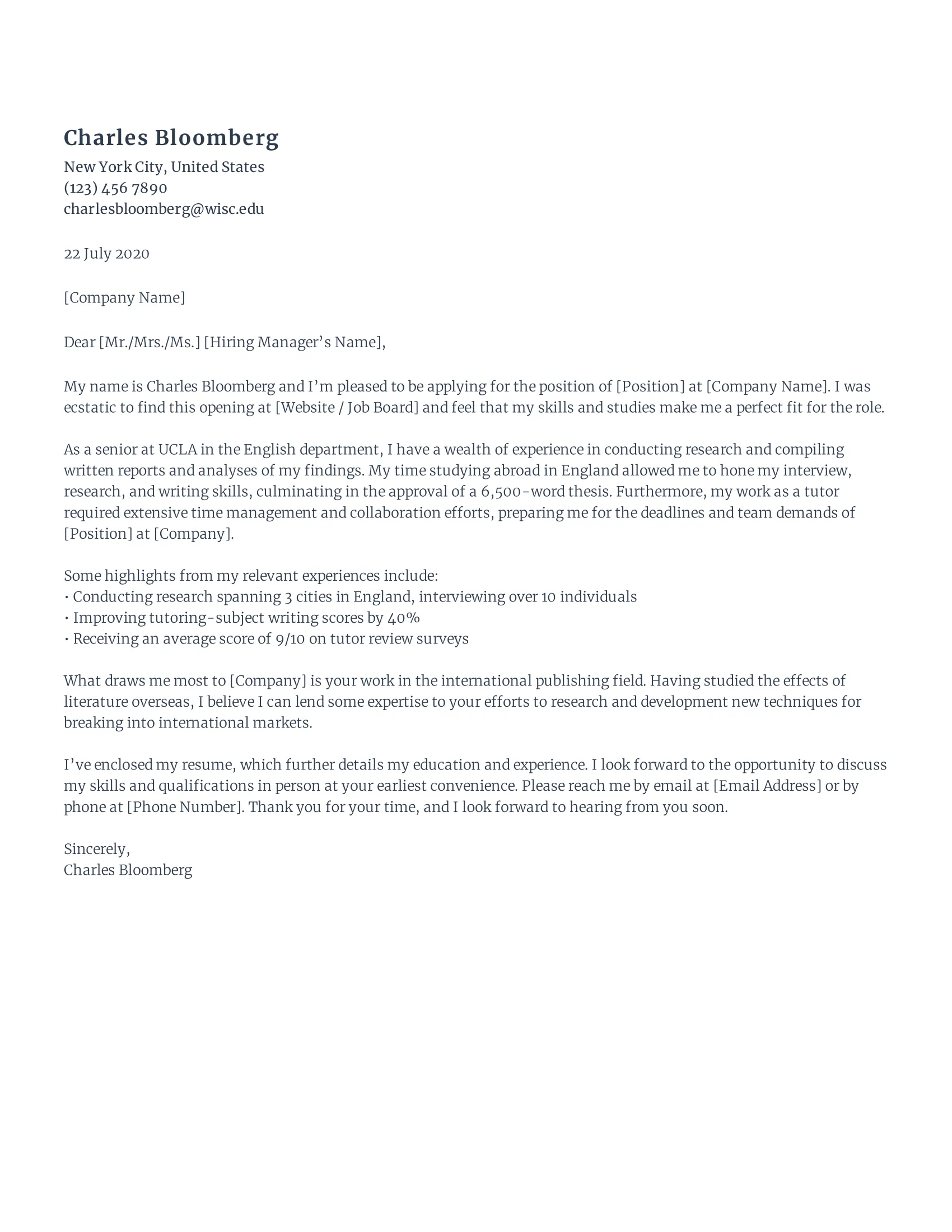
Do not send a generic cover letter. Personalize it for each college you are applying to. Research the college’s values, programs, and offerings. Tailor your letter to show how you fit within their community. Demonstrate genuine interest in the specific college. Highlight specific aspects of the college that appeal to you, such as certain programs, research opportunities, or faculty members. Generic letters signal a lack of effort and can undermine your chances of admission. Make sure your letter is specific to the individual college’s goals and values.
Formatting and Presentation Tips
The appearance of your cover letter matters, so pay attention to formatting. Clean formatting and a well-organized presentation enhance readability and professionalism. Your ability to be clear and concise is reflected in the format you choose. These tips will help you make an effective cover letter.
Font and Font Size
Choose a professional and easy-to-read font, such as Times New Roman, Arial, or Calibri. Maintain a font size of 11 or 12 points for the body of the letter. Ensure the font is consistent throughout the entire document. Use bolding and italics sparingly to emphasize key points. A clean font helps make the letter easier to read, which will leave a positive impression on the admissions committee.
Margins and Spacing
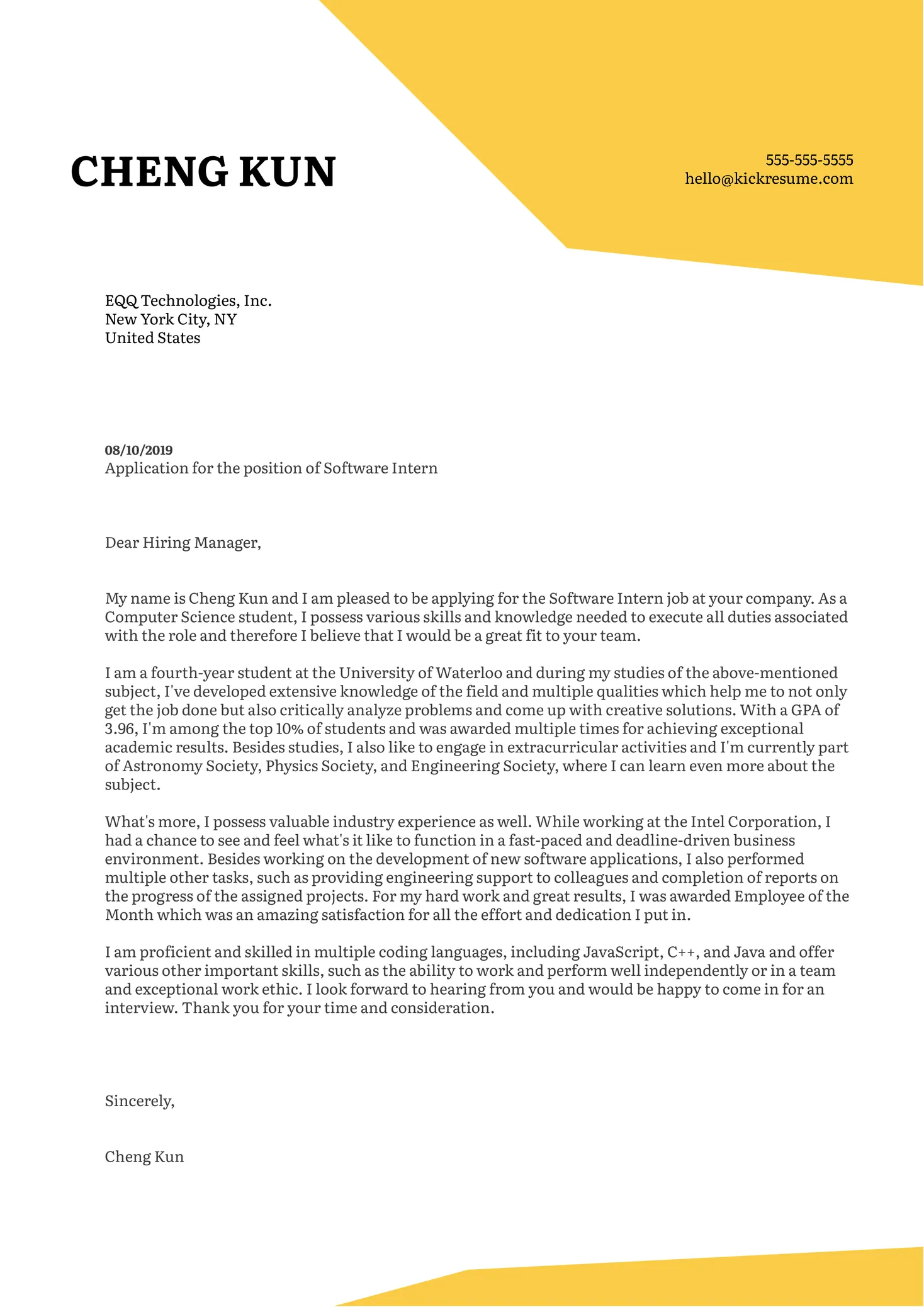
Use standard one-inch margins on all sides of the page. Use single-spacing for the body paragraphs and double-spacing between paragraphs. This will provide a good visual structure for the admissions committee. The formatting will make your cover letter look more organized and will make it easy to read. Be consistent with spacing and formatting.
Proofreading and Editing
Proofread your cover letter multiple times, checking for errors in grammar, spelling, and punctuation. Ask another person to review the letter to provide feedback and catch any mistakes you may have missed. Edit your letter to ensure the writing is clear, concise, and engaging. Make sure your writing is focused and addresses what the admissions committee is looking for. Proofreading your work can make a big difference in a successful cover letter. Ensure your cover letter showcases your strengths and abilities.
Crafting a strong college application cover letter is crucial for showcasing your potential and demonstrating your interest in the institution. By following these guidelines, you can present yourself effectively and increase your chances of acceptance. Good luck with your college applications!
